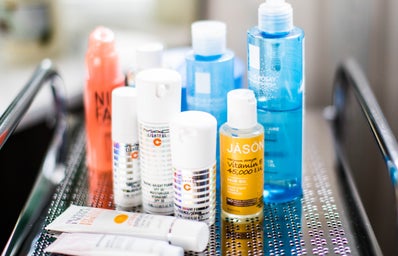Okay, let’s face it: breakouts blow. Not to mention, we get them at the worst possible times, like during our periods and when we’re really stressed out. Darn those pesky uncontrollable hormones, right? Well, maybe not. Hormones can absolutely cause breakouts, but they aren’t the only thing—it turns out that some acne can be attributed to underlying internal health problems, which, believe it or not, aren’t impossible to uncover and alleviate! Face mapping is an alternative medicine practice that looks at where acne appears on your face and points out possible health issues that may be associated with your acne.
Now, don’t assume you have a serious health problem just because you get a pimple on your chin now and again. Face mapping isn’t an exact science, so be sure to take it with a grain of salt! However, if your acne frequently appears in the same place, or you have chronic acne and no solution, it might help consider what those pimples might be telling you. To get you started, here are eight of the most common places for acne to appear and health problems that are associated with each location:
1. Forehead
Acne on your forehead is could be an indication that digestion is poor. Opt for water as often as possible, and reduce intake of caffeinated and overly processed drinks like soda. Water also helps flush out toxins and therefore aids in digestion, along with reducing overall fat intake.
2. T-zone
Acne on and around your nose has been said to be connected to your liver, so reduce your consumption of alcohol, processed food, greasy food and dairy products. Acne in the t-zone could also be your skin responding to a food allergy, so make sure your allergy tests are up-to-date!
3. Around the eyes
Girl, get hydrated! Skin around the eyes is supposedly linked to your kidneys, therefore anything from acne to dark circles in that area could be due to lack of water, according to Dermalogica (a well-known skincare brand that bases its treatments off of face mapping to diagnose and treat root causes of acne). Drink up!
4. Upper cheeks
According to Fitness Magazine, skin disorders on the top of your cheeks are linked to the lungs, which could be due to toxins from air pollution or smoking. Additionally, bacteria on objects that are constantly in contact with your face, such as your cell phone or makeup brushes, can also contribute to the problem.
5. Lower cheeks
Acne on your lower cheeks could be due to poor dental hygiene. It is usually attributed to problems with the gums, especially when they are inflamed on the inside, which could possibly be causing breakouts on the outside. Brushing and flossing daily, in addition to cutting out some sugary food and drinks, should take care of this problem.
6. Nose
If your nose is swollen, then your acne might have to do with high blood pressure. Changing up your diet by reducing sodium intake, avoiding energy drinks and eating more fruits and vegetables will lower your blood pressure may take care of it, although it may be worth visiting a doctor, as high blood pressure can be sign of other health problems. In an interview with Byrdie, Dr. Dan Hsu (a specialist in Eastern medicine) recommends reducing consumption of spicy food and meat,\ and swapping them out for fruits and veggies.
7. Ears
Like the eyes, the ears are also linked to kidneys, so if you are breaking out on your ears, it may be signaling dehydration. Be sure that you are drinking enough water and reducing your sodium intake!
8. Chin
Acne on or near your chin might be traced back to a hormonal imbalance, which can be caused by stress or menstruation. In the same Byrdie interview, Hsu suggests getting hormone levels tested, drinking spearmint tea and taking omega-3 supplements to take care of these breakouts.
There you have it, collegiettes. So much of our external health depends on our internal health, and skin is no exception. So the next time you have a huge breakout that just won’t disappear, try turning to your face map! That being said, it’s important to remember not to self-diagnose if your acne gets worse, and instead, make a trip to see your doctor or dermatologist. Of course, following a healthy lifestyle never hurts and will likely leave you with softer, clearer skin regardless of face mapping’s accuracy.

